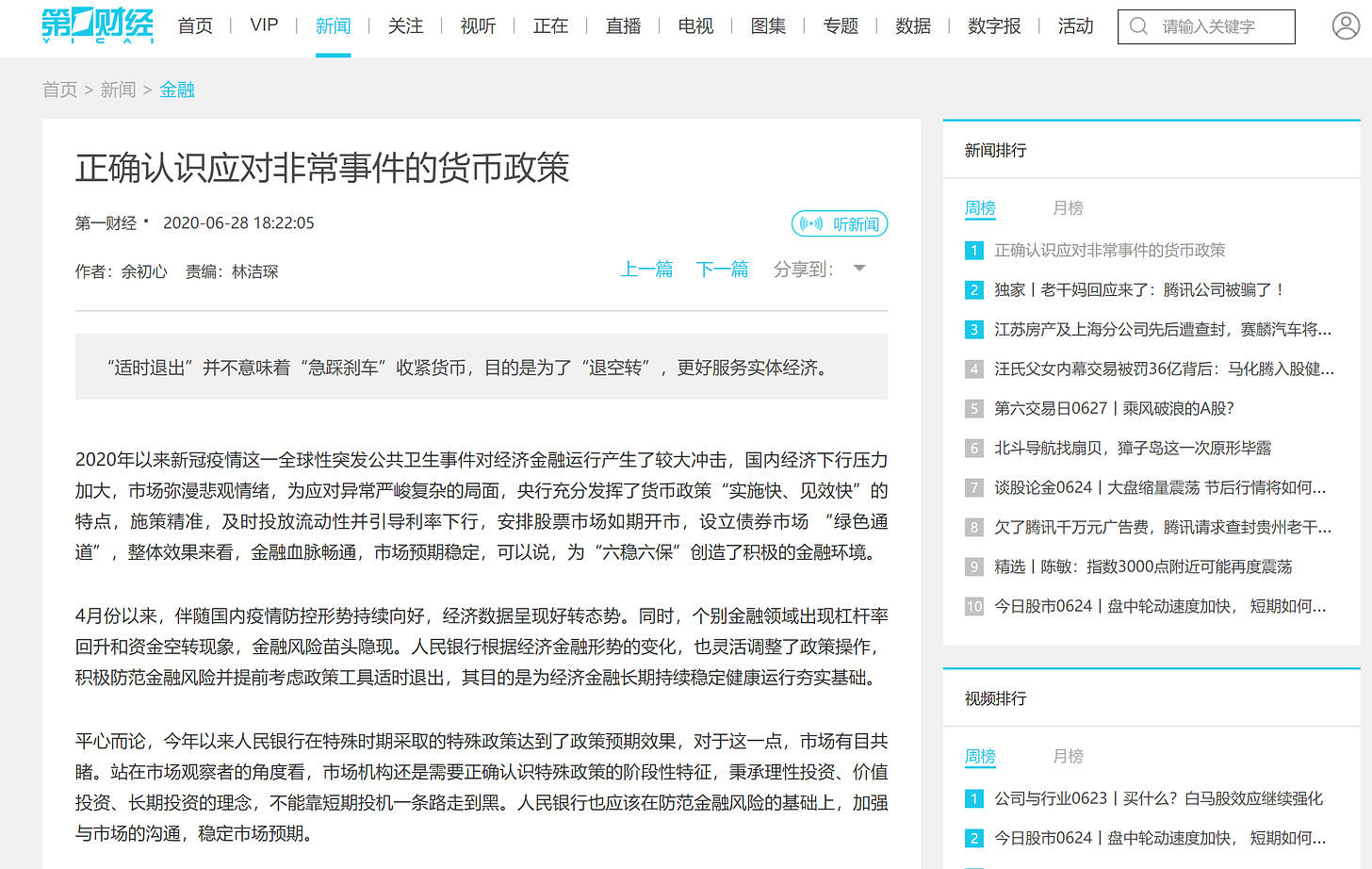Yu Chuxin: The Mysterious "Senior Scholar" Who's Been Gripping Chinese Financial Professionals
The unmysterious message: there will be a withdrawal of post-pandemic monetary stimulus in due course.
余初心 Yu Chuxin, who has been identified only as a 资深学者 Senior Scholar, has been gripping Chinese financial professionals since Yu's short essay was published on the evening of Sunday, June 28.

While there is currently little to no mention of Yu's article in the English-language mediasphere, a search of the Chinese name 余初心 returns significant discussions.
In an article posted on the website of 第一财经 Yicai, a Chinese media conglomerate formerly branded as China Business Network focused on the economy and in particular finance, Yu asked readers - now effectively a large chunk of participants in the Chinese monetary market - to 正确认识应对非常事件的货币政策 Properly Understand the Monetary Policy in Response to an Extraordinary Event, apparently referring to China's monetary relaxation in the wake of the coronavirus pandemic.
In scholarly but still accessible languages, Yu revisited the monetary relaxation's positive effects in shoring up the Chinese economy but also underlined the latest 灵活调整了政策操作 flexible adjustment of policy - in effect, a tightening of the relaxation and a withdrawal of stimulus monetary policies in due course. There are words that could even be understood as a warning.

Sunday's article is not Yu's first writing. Yu also penned another one 央行与财政关系的转型与现代化 Transformation and Modernization of the Relationship between the Central Bank and the Treasury https://www.yicai.com/news/100634948.html on May 19, when there was a debate in the Chinese financial circles on that subject. While there is no authoritative information of who Yu Chuxin is, the Chinese-language discussions tend to pin Yu as the pen name of a person or a team with ties to (a) certain regulatory authority(es).
For China watchers, the use of pen names to shape public discourse on certain matters is hardly a novel practice. For example, in the China-US trade negotiations, 陶然笔记 Taoran Notes gained a lot of attention both within and outside China. More broadly, certain pen names routinely appear on Chinese media, underscoring the content's authoritativeness and importance..
I must add, in ALL CAPITAL LETTERS: I HAVE NO INSIDE INFORMATION WHATSOEVER HERE AND THIS IS NOT AN INVESTMENT ADVICE - UNDER NO CIRCUMSTANCES WILL I BE RESPONSIBLE FOR INVESTMENT OR FINANCIAL-RELATED DECISIONS MADE AS A RESULT OF ANY INFORMATION HERE. For an accurate understanding of Yu's article, please refer to the original Chinese-language writing on Yicai https://www.yicai.com/news/100680270.html
The gist of Yu's article is as follows - NOT verbatim, I omitted many, many highly technical numbers that Yu detailed. I don’t there is any reason to doubt those numbers, plus this post would otherwise be exceedingly lengthy:
To cope with the exceptionally severe and complicated situation in the aftermath of the coronavirus pandemic, the central bank implemented special policies that have achieved positive results.
Since April, along with the improvement of China's control of the pandemic, economic data has shown an improving trend. At the same time, there has been a resurging of leverage and 资金空转 funds circulating within the financial sector without entering the real economy - signals of financial risks emerging intermittently.
In response, the People's Bank of China has since flexibly adjusted its policy operations to actively prevent financial risks, as well as has been preemptively considering the withdrawal of relevant policies at an appropriate time, in order to lay a solid foundation for the long-term, sustained, stable and healthy functioning of the economy and the financial market.
From the perspective of an observer of the market, financial institutions need to properly understand the phase-specific characteristics of the special policies and uphold the philosophy of rational, value-based, and long-term investment. They can not rely on short-term speculation, which only leads to darkness.
Immediately in the wake of the pandemic, if measures had not been taken to promptly restore the functioning of the financial market, reduce the cost of financing for businesses, or ease their cashflow pressures, the consequences would have been unimaginable. As a result, the PBoC took a number of measures, which achieved immediate positive results. All the while, the stimulus policies were still within the framework of the traditional monetary policy and thus reserving further policy operations - unlike the 大水漫灌 flood of liquidity facilitated by foreign central banks.
Gauging the data for the first five months, China's economy has gradually shifted to a better direction. Now, does the stimulus need to be adjusted well in advance to avoid side effects that could impede the future becomes an important consideration?
Looking specifically at the financial market, funds circulating within the financial sector without entering the real economy and signals of financial risks have appeared, prompting the need of the PBoC to take timely and decisive measures.
Withdrawal of special policies at an appropriate time does not equal a 急踩刹车 "slam on the brake" - the goal is to get rid of funds circulating within the financial sector without entering the real economy. The recent financial market adjustment is aimed at arbitraging and funds circulating within the financial sector without entering the real economy, which, with a stimulus, was inherently difficult to avoid completely. The purpose of new policies is to curb the enlargement of the bubble in a timely fashion and to direct money to the real economy.
Market participants should manage their expectations and properly understand the special monetary policies which came at a special time aka the pandemic. The formulation and implementation of macro policies are necessarily the result of an integrated consideration based on a comprehensive compilation of relevant facts. The special policies launched in response to an unusual event can not exist indefinitely, and there will definitely be an appropriate moment when they are withdrawn. Market interest rates began to rise since the end of April. Some financial institutions which had reaped handsome profits have been existing. For those that are reluctant to “get off the ride”, they should be mentally prepared - profit or loss is theirs to bear. Enditem

